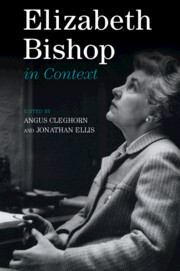Book contents
- Elizabeth Bishop in Context
- Elizabeth Bishop in Context
- Copyright page
- Contents
- Figure
- Contributors
- Acknowledgements
- Note on Referencing and Abbreviations
- Chronology
- Introduction
- Part I Places
- Part II Forms
- Part III Literary Contexts
- Part IV Politics, Society and Culture
- Part V Identity
- Chapter 25 Dreams
- Chapter 26 Humor
- Chapter 27 Gender
- Chapter 28 Queerness
- Chapter 29 Race
- Chapter 30 Nature
- Chapter 31 Animals
- Part VI Reception and Criticism
- Works Cited
- Index
Chapter 26 - Humor
from Part V - Identity
Published online by Cambridge University Press: 06 August 2021
- Elizabeth Bishop in Context
- Elizabeth Bishop in Context
- Copyright page
- Contents
- Figure
- Contributors
- Acknowledgements
- Note on Referencing and Abbreviations
- Chronology
- Introduction
- Part I Places
- Part II Forms
- Part III Literary Contexts
- Part IV Politics, Society and Culture
- Part V Identity
- Chapter 25 Dreams
- Chapter 26 Humor
- Chapter 27 Gender
- Chapter 28 Queerness
- Chapter 29 Race
- Chapter 30 Nature
- Chapter 31 Animals
- Part VI Reception and Criticism
- Works Cited
- Index
Summary
Elizabeth Bishop’s humor warily bridges gaps between subjectivities. As “12 O’Clock News,” “One Art” and “Filling Station” show, the comic moments in her poems present simultaneous, apparently incompatible interpretations of the world and help us gain insight into the unfamiliar minds behind those interpretations. Her humorous asides, wry ironies and satirical critiques help her hold competing ideas in double exposure: her levity presents varying viewpoints without taking sides. Her humor fuses empathy with judgment, as her subjects’ and speakers’ frailties are to be both rejected and felt as our own. At the same time, her work explores the similarities between humor and poetry. Poems show us relationships among apparently incommensurable objects and help us gain insight into the minds of others. They do this by valorizing ambiguity and flux, allowing us to juxtapose apparently incompatible ideas and thus gain access to other subjectivities without losing track of our own.
- Type
- Chapter
- Information
- Elizabeth Bishop in Context , pp. 302 - 312Publisher: Cambridge University PressPrint publication year: 2021

